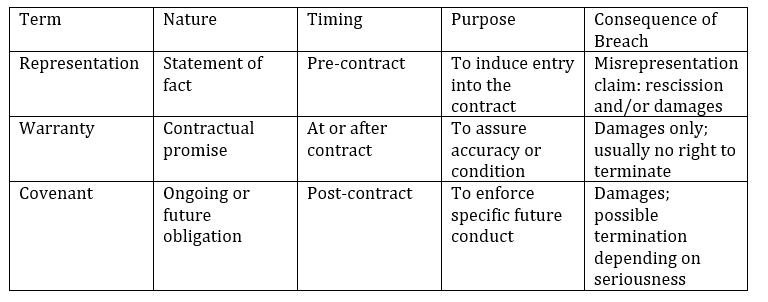In commercial contracts governed by the laws of England and Wales, the terms representations, warranties, and covenants are frequently used—but each has distinct legal meanings and consequences. Understanding these differences is essential for ensuring that contracts are clearly drafted, enforceable, and aligned with the parties’ intentions. This article explains what these terms mean, when to use each one, and their implications under English law.

1. Representations
A representation is a statement of fact made by one party to another before the contract is formed, with the intention of inducing the other party to enter into the contract. In English contract law, representations typically concern past or existing facts. If a representation proves to be false, it may give rise to a claim for misrepresentation.
When to Use Representations
Use representations:
- When asserting facts or circumstances prior to the contract being signed.
- To confirm key information the other party relies on to enter the contract.
- To protect against reliance on false or misleading information.
Typical scenarios include:
- Disclosures in share or asset purchase agreements (e.g. “no pending litigation”).
- Statements made during pre-contract negotiations that are material to the deal.
Example:
“The seller represents that the company is not subject to any pending or threatened litigation.”
Legal Consequences
If a party enters into a contract relying on a false representation, they may have remedies under the Misrepresentation Act 1967, including:
- Rescission of the contract (setting it aside); and/or
- Damages, depending on whether the misrepresentation was fraudulent, negligent, or innocent.
2.Warranties
A warranty is a contractual promise that a particular statement or condition is true and will remain true for a specified period. Unlike representations, warranties are contractual terms. A breach of warranty typically gives rise to a claim for damages, but does not usually entitle the innocent party to terminate the contract unless the warranty is fundamental to the contract.
When to Use Warranties
Use warranties:
- When you want to guarantee that a fact or condition is true at the time of signing and will remain true during a defined period.
- To allocate risk and establish a clear basis for damages if a statement turns out to be incorrect.
- In due diligence-heavy transactions, such as business sales or supply contracts, where detailed assurances are needed.
Typical examples:
- The condition of goods or services.
- Compliance with laws or regulations.
- Financial disclosures in acquisition agreements.
Example:
“The seller warrants that the goods supplied will conform to the agreed specifications and be free from defects for a period of 12 months.”
3. Covenants
A covenant is a binding obligation to do or refrain from doing something in the future. Covenants differ from warranties and representations in that they impose ongoing or future contractual obligations. A breach of covenant is treated as a breach of contract which may entitle the injured party to claim damages, and in serious cases, terminate the contract.
When to Use Covenants
Use covenants:
- To establish ongoing duties or future restrictions.
- When it’s important that a party takes or avoids a specific action over time.
- To maintain contractual discipline throughout the relationship.
Common uses:
- Non-compete and non-solicitation clauses.
- Payment obligations.
- Confidentiality undertakings.
- Promises to maintain insurance or regulatory compliance.
Example:
“The buyer covenants to pay the agreed purchase price by the due date specified in the contract.”
Dual Role of Statements: Representation and Warranty
A single contractual statement can operate as both a representation and a warranty. Whether a statement does so depends on the parties’ intentions and the drafting of the agreement. Courts assess the substance of the statement, not just its label.
Key Differences in England and Wales

Additional Notes on Implied Terms
Some warranties and covenants may be implied by statute, including:
- Sale of Goods Act 1979 – e.g. implied warranty that goods are of satisfactory quality:
- Supply of Goods and Services Act 1982 – e.g. implied term that services will be carried out with reasonable care and skill:
Conclusion
In commercial contracts in England and Wales, knowing when and how to use representations, warranties, and covenants is essential for risk allocation and enforceability:
- Use representations to confirm facts that induce contract formation.
- Use warranties to guarantee the truth of certain facts or conditions, often for post-signing assurance.
- Use covenants to impose ongoing or future contractual obligations.
Precise drafting ensures clarity, appropriate remedies, and protection for all parties. For significant transactions, always obtain professional legal advice to ensure alignment with English law and mitigate legal risk.
For businesses navigating commercial contracts, 360 Business Law provides expert guidance in ensuring that representations, warranties, and covenants are correctly defined and enforceable. The team at 360 Business Law can help draft clear, comprehensive contracts tailored to business needs, reducing risk and enhancing legal certainty in every transaction.